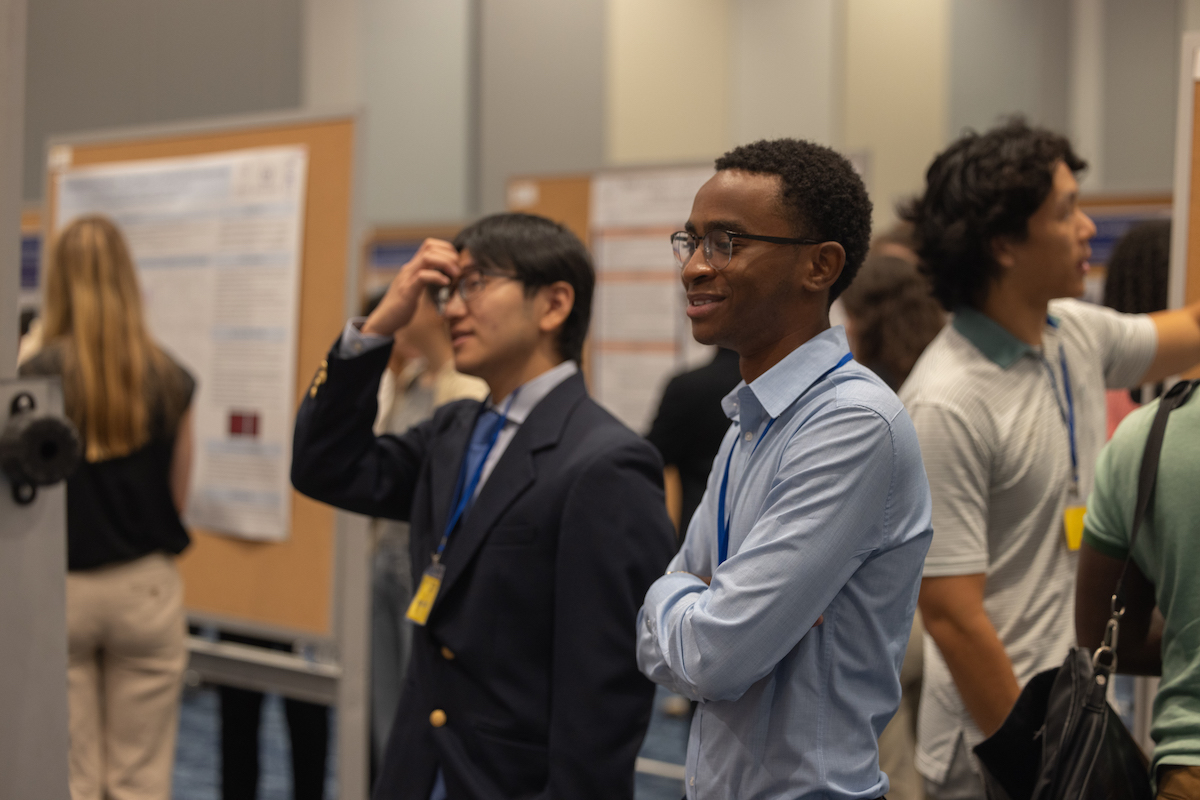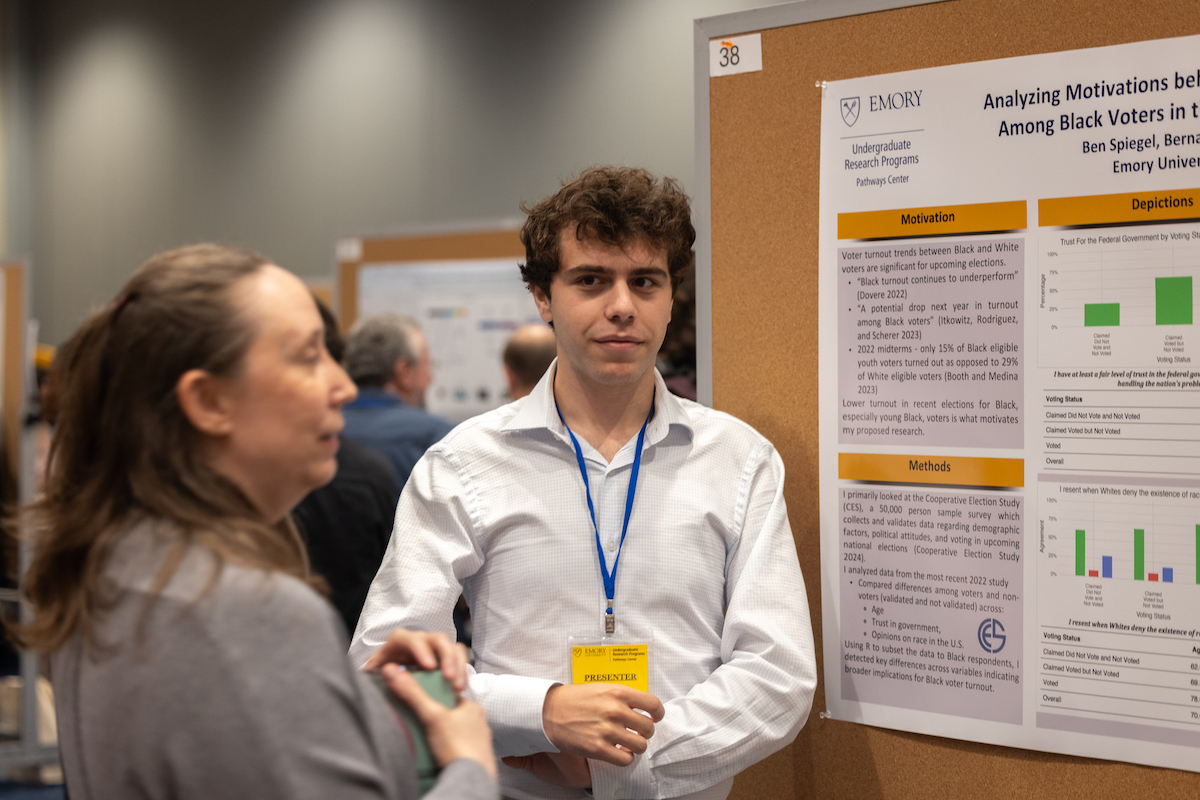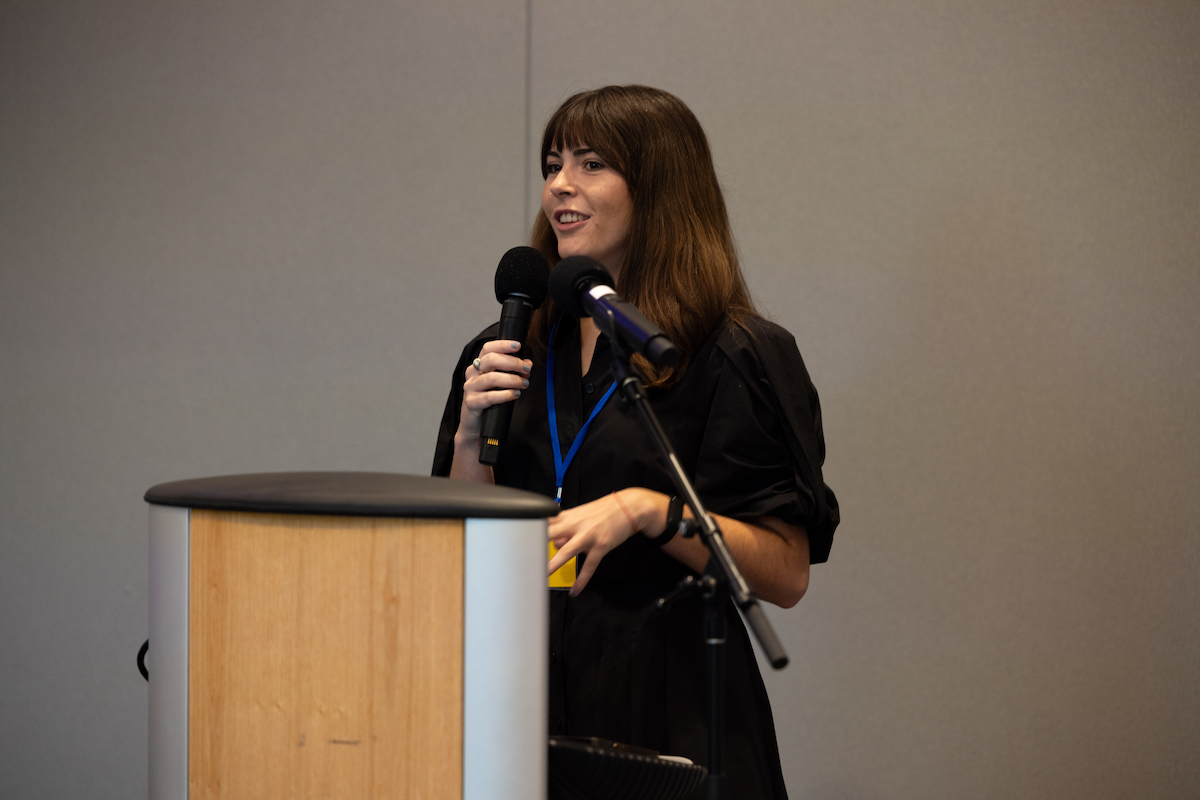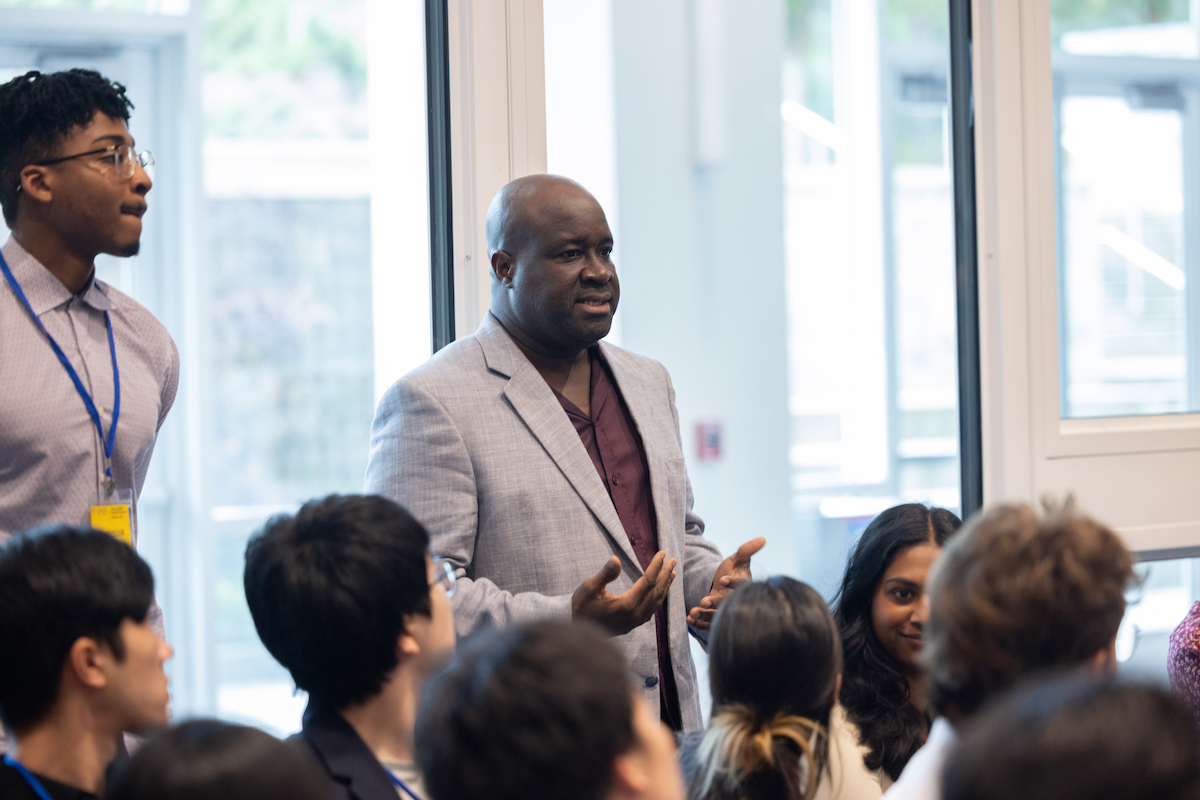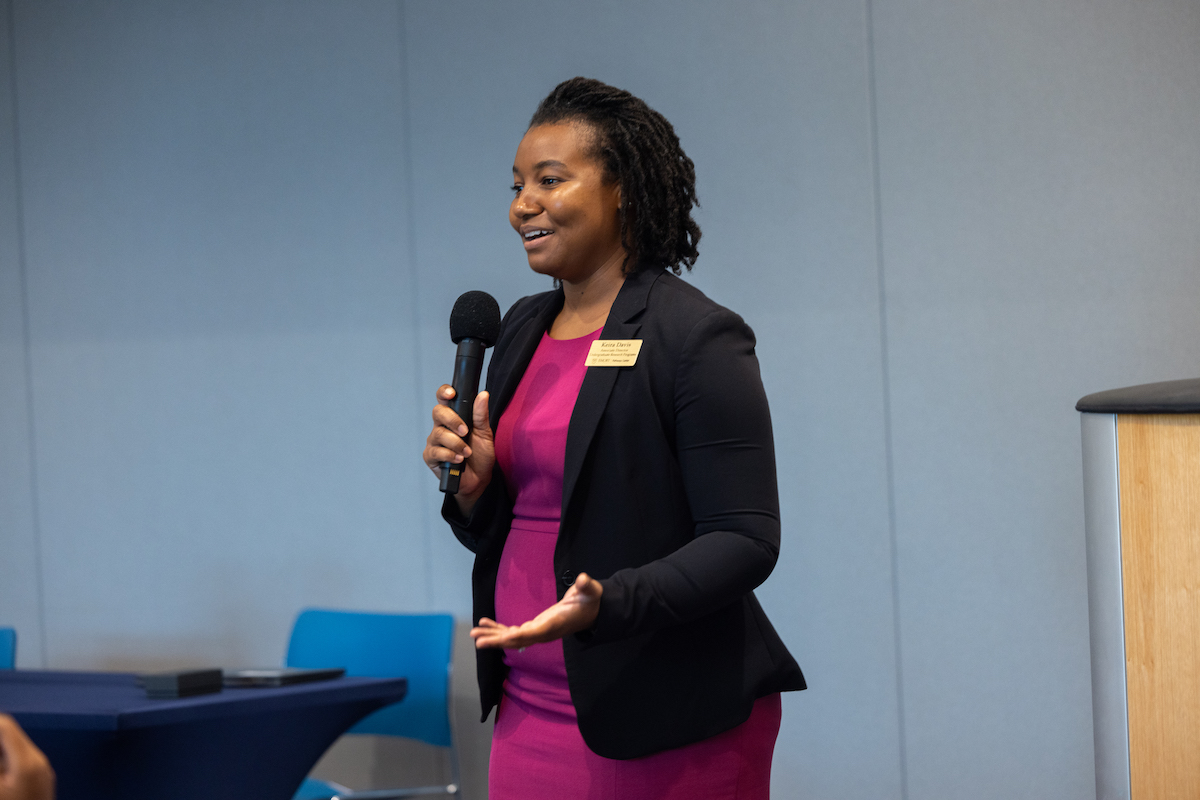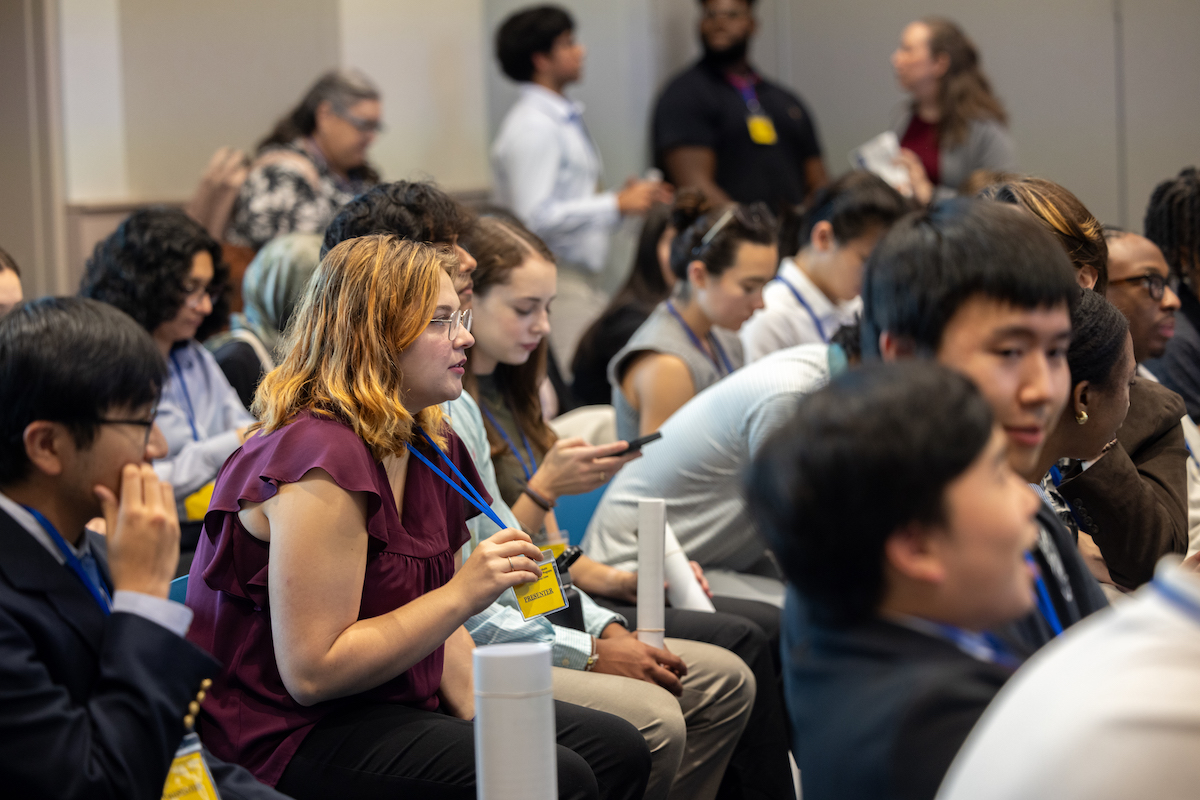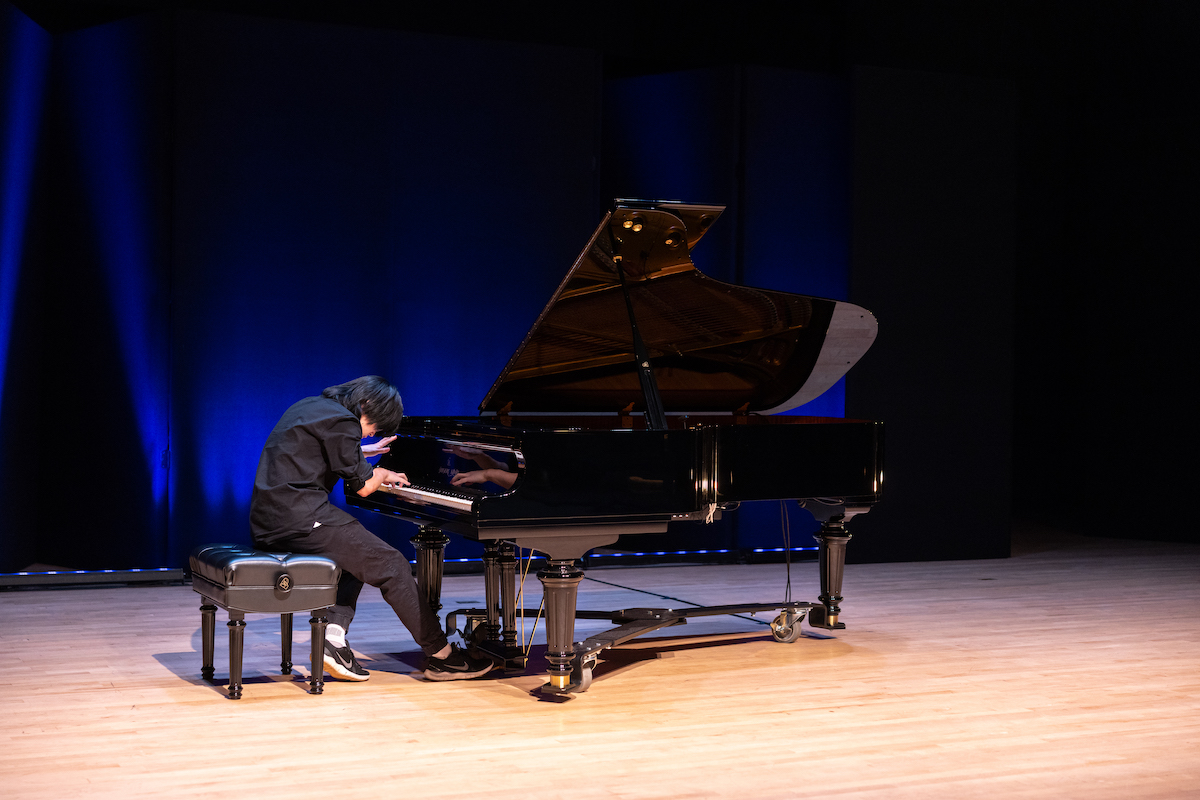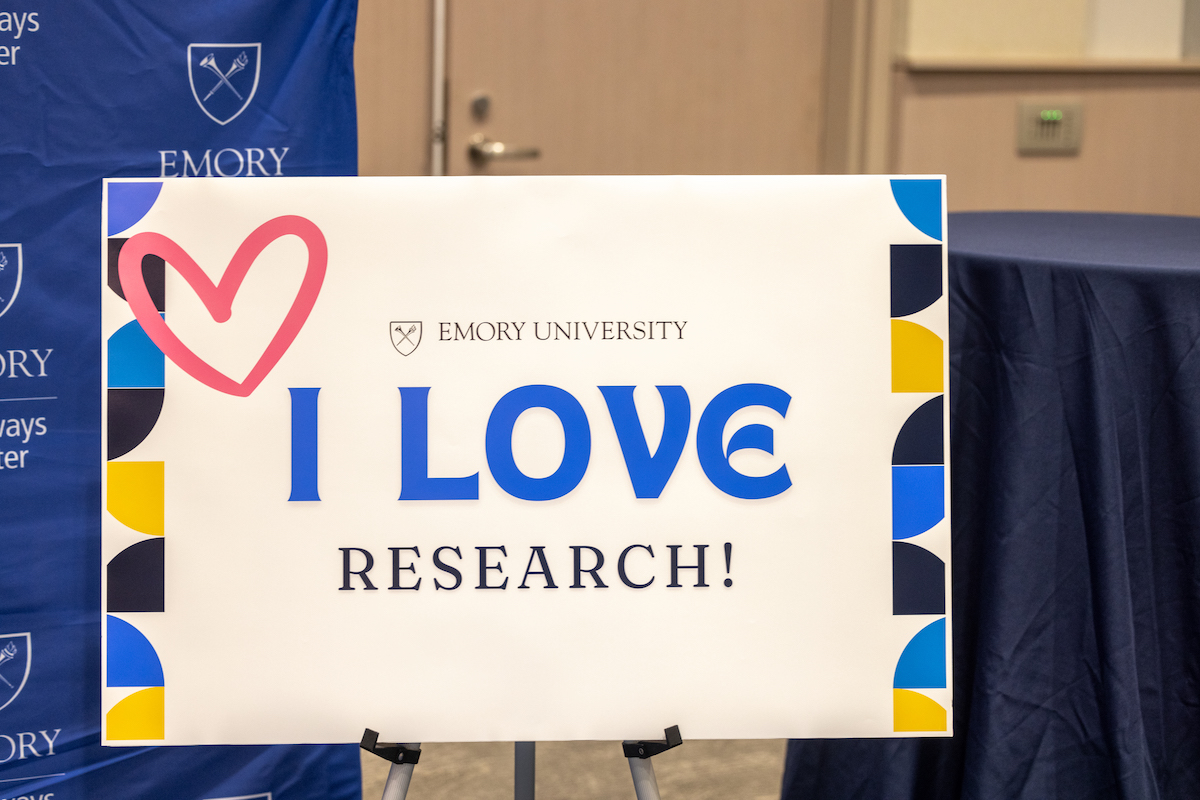Emory’s Atlanta campus was alive with thought-provoking discussion, inquisitive questions and displays of intellectual curiosity during the Summer Undergraduate Research Symposium at the Emory Student Center and Performing Arts Studio on Wednesday, July 31.
More than 111 undergraduate students from Emory and other institutions across the country spent 10 weeks in the Summer Undergraduate Research Experience (SURE) program conducting independent research, connecting with distinguished researchers and forging bonds with fellow students.
The SURE program, housed in Undergraduate Research Programs (URP), an office within the Pathways Center, provides housing and a stipend to support students’ research and professional development efforts. Research projects this summer encompassed a variety of fields, including arts, humanities and sciences. In addition to conducting full-time research under a faculty member’s supervision, students participated in professional development exercises and seminars.
Keira Davis, associate director for undergraduate research in URP, expressed pride in the variety of disciplines represented at the symposium.
“We need an interdisciplinary approach to move forward in the world. It’s critical to have multiple perspectives from different backgrounds,” said Davis. “Sometimes, for example, a science major would interpret something different than a history major. Having all these different projects in one room is valuable beyond measure.”
Davis also noted her excitement about the future of undergraduate research at Emory.
“I'm enthusiastic about the future of undergraduate research on campus, especially as we expand into interdisciplinary approaches. It will be fascinating to see how collaboration across various fields and departments enhances the depth and breadth of research opportunities,” said Davis.
Ten weeks of dedication to research
The symposium opened in the morning with two stirring piano performances in the Performing Arts Studio by Satvik Elayavalli and Peiming Yang, both supervised by Elena Cholakova, professor of piano studies and associate music professor.
Yang, a rising senior double majoring in music composition and psychology, spent 10 weeks studying and practicing Chopin’s Ballade No. 2 and No. 3. He noted how SURE allowed him to explore his passions in piano.
“During the regular semester, it’s really hard for me to devote time to practicing because of academics, so summer is a great opportunity to concentrate and focus on piano,” Yang said. “SURE has enabled me to do that.”
Following the piano performances, students, mentors and supporters moved into the Emory Student Center for an afternoon of oral and poster presentations.
Max Coplin, a rising senior from Brooklyn, New York, focused on a topic within her classics major and ethics minor. Her oral presentation, “Rational Hippocratic magic: Is there a place for magic in the healing traditions of Classical and Hellenistic Greece?” was supervised by Sandra Blakely, chair and associate professor of classics.
Coplin’s project had surprising findings. She discovered that folk, magical and Hippocratic healing existed in the same space at the same time in ancient Greece, a conclusion that goes directly against many scholarly perspectives.
“The research has implications in the usage of cases from the ancient world in modern medicine and anthropological studies,” said Coplin. “It’s important work to further the field concerning the relations between traditions of magic and medicine.”
Blakely said the project was a natural extension of discussions they’d held in a class Coplin took last spring.
“Max is such a self-starter. She came into the project with fully formed questions and it was wonderful to see her set parameters of how much she was going to read and then really digest it and create the webwork of meaning between current scholarship and old scholarship,” said Blakely.
“The summer research experience is one in which the student has a chance to let the sources themselves speak a little more clearly than during the semester when they’re just barreling toward the next exam or paper. There’s an organic quality about it that really maps onto what it means to do professional research in the field,” continued Blakely.
Toluwanimi Olaleye, an Oxford College and rising third-year student studying psychology from Philadelphia, also delivered an oral presentation, titled “Gun violence as a public health crisis: Exploring its impact on the mental health of children and adolescents.” Olaleye was mentored this summer by Leyla Eghbalzad, assistant professor of psychology at Oxford College.
Olaleye conducted a literature review and interviewed professionals in health care, public policy and gun violence advocacy. She found both legislative and community-based factors that influence gun violence.
“After being personally affected by gun violence, it was something I wanted to research. Coming to Oxford and hearing about the SURE program, I knew it was a way to pursue this further,” said Olaleye. “After this research, I’m considering taking it a step further and getting a master’s degree in public health.”
In the poster presentation hall, students displayed charts, graphs, research questions, suggestions for further research and more. They proudly stood by their posters — many alongside their project mentors — engaging visitors and explaining what they spent their time researching this summer.
Bella Parker, a rising fourth-year student from Newnan, Georgia, spent her summer at Emory, away from her home institution of Stetson University in Florida. The molecular and cellular biology major worked on a project titled “Investigating the effects of antibiotics on e. coli K-12 outer membrane permeability in response to O antigen re-introduction,” mentored by Marcin Grabowicz, associate professor of microbiology in the School of Medicine.
Parker was eager to gain more experience in a new lab and in a field related to previous lab work she’d completed.
“Marcin has taught me so much. Last summer, I worked in a cell culture lab at Wake Forest University School of Medicine, and this summer was a transition from cell culture to more bacterial physiology,” said Parker. “Being able to learn different techniques and expose myself to different biological fields has been great. I also loved participating in a program that invests in undergraduate endeavors and their futures.”
Grabowicz expressed his excitement about having new, eager students in the lab to tackle intense scientific endeavors.
“It’s easy to lose sight of how exciting working in a lab is for students because I’ve done it for so long,” said Grabowicz. “It’s nice to see them come in and learn the techniques that we take for granted every day, and to get a sense of that enthusiasm and motivation to get experience.”
Cormack Ye, a rising fourth-year student majoring in interdisciplinary studies, used his time in SURE to conduct research for what will become his senior thesis. The research, titled “Development and application of AI curricula in Emory University’s Goizueta Business School: Strategies for addressing labor market changes,” was advised by Mark Risjord, director of the Institute for the Liberal Arts at Emory.
“Dr. Risjord is a great professor who knows so much about interdisciplinary study, which is a critical component if you really want to understand AI,” said Ye. “It’s been great for this to be my main focus this summer and to talk with Dr. Risjord weekly.”

